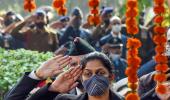'The families of those who die during operations are looked after very well by the army, but those who die in non-combat situations do not receive the same attention.'

Sambandh means relationship in Hindi. And with Project Sambandh, retired Colonel Vembu Shankar, whose brainchild it is, aims to establish just that -- a relationship between the army and the families of soldiers who have died in non-operational areas.
"The families of those who die in war and during operations are looked after very well by the army, but those who die in non-combat situations do not receive the same attention," says Colonel Shankar, who was awarded a Shaurya Chakra for gallantry.
When a soldier dies in a war or during a military operation, his family gets 100% pension -- in other words his salary for the rest of the widow's life -- but for the widow of a soldier who dies otherwise it is 30% to 60% of salary depending on the length of his tenure in the army, the colonel points out.
He started this mission in 2017 for which he prematurely retired from the army and has helped scores of families get their due.
"Every year, 100 army men die in the field while a thousand die for non-operational reasons like ill-health, accidents and suicide," explains Colonel Shankar. "I trace the family and then do what is needed to help them."
When they serve in the army, soldiers live in a cantonment where there is a school, hospital and everything they need, but after the soldier dies the family has to go back, to the in-laws who sometimes turn hostile. Or they move to the parents' home or to another place where they are not in contact with anyone in the army or the unit where the husband served. Thus, they are unaware of the various schemes that the army and the government has to help them.
For instance, the army and the government provide scholarships for the children's studies, a grant for marriage, help during hospitalisation and also a grant/loan if the family wishes to start a business.
But the young widows are not aware of this, Colonel Shankar says, so he helps them get the benefits they are entitled to.
He does this by himself and does not collect any funds for the same, at times travelling extensively on his mission. He gets details of deaths from Army Headquarters and also from individual army centres.
After tracing the families, he submits their latest address to the army for its records.

Colonel Shankar, who was commanding a unit in the north east when he retired, has so far helped 22,000 families.
The colonel has built a databank of the families and travels all over the country, gathering information to help them. He looks out for families of soldiers who died after 2000.
"They (the families) are looked after for the first three or four years, but after that they are on their own," he says.
"The army has started a special cell called Veerangana Seva Kendra to help these famlies, and Project Sambandh helps connect the families to this cell," he adds.
Project Sambandh can be reached at theprojectsambandh@gmail.com











 © 2025
© 2025